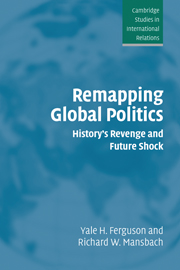Book contents
- Frontmatter
- Contents
- Preface
- Acknowledgments
- 1 Postinternational politics
- 2 Theory and method
- 3 Political space and time
- 4 States and other polities
- 5 Identities in a postinternational world
- 6 A postinternational world economy
- 7 War in a postinternational world
- 8 Technology and change
- 9 The future
- Index
- CAMBRIDGE STUDIES IN INTERNATIONAL RELATIONS
9 - The future
Published online by Cambridge University Press: 22 September 2009
- Frontmatter
- Contents
- Preface
- Acknowledgments
- 1 Postinternational politics
- 2 Theory and method
- 3 Political space and time
- 4 States and other polities
- 5 Identities in a postinternational world
- 6 A postinternational world economy
- 7 War in a postinternational world
- 8 Technology and change
- 9 The future
- Index
- CAMBRIDGE STUDIES IN INTERNATIONAL RELATIONS
Summary
The central theme of this book is that the capacity, legitimacy, and authority of sovereign states are decreasing and that we have entered or are entering a new postinternational epoch of global politics. Evidence is to be found in all dimensions of political, economic, and social life, even, as van Creveld points out, in “the field of sport,” where “[f]rom the Olympics down, the most important competitions have become commercialized.” Nevertheless, it must be acknowledged that it is also possible that future historians may look back on the decades after the end of the Cold War as a brief interlude before a return to security-business-as-usual; that is, intense and dangerous rivalry among major states. History reminds us of the euphoria that follows many wars and of the accompanying expectations for major change and a benign future. History is not a one-way street, and political forms and practices may evolve in different directions.
Were a new era of interstate tensions to begin, it would strengthen the governments of some states vis-à-vis their own peoples, again highlight military preparation and alliances, and encourage us to dust off all the old realist literature. Such literature tells us about a world that thinks like Hobbes, Morgenthau, and Waltz, one quite different from that of Rosenau or Rosecrance. More debatable is whether the sort of “political crack-up” sketched in sensational fashion by Robert Kaplan – terrorists with nuclear weapons in suitcases, snipers on street corners, bioterror outbreaks, and so on – is, as he insists, “just beginning to occur worldwide.”
- Type
- Chapter
- Information
- Remapping Global PoliticsHistory's Revenge and Future Shock, pp. 312 - 342Publisher: Cambridge University PressPrint publication year: 2004

